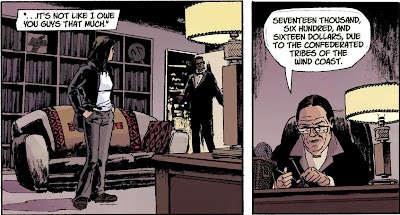Comic book characters live forever. Sure, Captain America and Batman recently "died," but not really. They were actually just shot through time. The Martian Manhunter was recently killed off in DC's Final Crisis, but does anyone really expect him to stay dead?
Superheroes and villains who don't have an unnatural ability to cheat death also manage to live forever. Perhaps the main reason for this is the notorious retcon, which Mark discusses at greater length here. Despite these elements keeping characters alive, there are actually still some good old-fashioned immortals living in these universes. These are the heroes and villains who naturally age at a much slower pace than the rest of humanity, use magic, have healing factors, and have access to nanotechnology or to Lazarus Pits. Regardless, they all end up living to be hundreds or thousands of years old. These are people like Wolverine, Ra's Al Ghul, Deadpool, Vandal Savage, Nick Fury, Black Widow etc.
Take Superman. Although Superman technically ages and may one day die of natural causes, several comics have established the notion that his life span would extend considerably beyond that of the average human. In most elseworlds tales that depict the future of the DC Universe, Superman is still portrayed as being full of vitality and bearing the appearance of a much younger man than his cohorts in the Justice League. Superman, however, is actually Clark Kent, who works as an investigative journalist for the Daily Planet.
In fact, many of these immortals have day jobs. They earn disposable incomes, buys things, pay taxes, and have retirement accounts. And this is where the problem comes in from an economic standpoint.
The problem with having a population of these immortals running around is that they could actually be a drain on the U.S. economy. I'm not talking about the rampant destruction they cause either. Specifically, I'm referring to the expenditures of entitlement programs like Medicare and Social Security.
Medicare is simple enough. You hit age 65 and you are automatically enrolled in a social insurance programs that provides you with government-sponsored insurance for the rest of your life.
Social security, on the other hand, is a little more complicated. To receive retirement benefits, you need to have worked for at least 10 years. While you work, you pay what's known as the Federal Insurance Contributions Act (FICA) tax on your earnings (as does your employer), which goes directly towards funding retirees currently collecting on social security benefits. Once you hit retirement age (regular age for people born after 1960 is 67, or you can elect to retire at the early age of 62, but receive a smaller benefit), you become eligible to receive your annuity payment (a payment for the rest of your life). The benefit you receive is dependent income you've earned for the 35 years of work in which you earned the most. If you've worked for less than 35 years, the missing years are just filled in with 0s.
You can begin to see why this is problematic with a society populated by people who don't die for centuries or millennia. So what exactly happens when your life can extend many years beyond that of an ordinary human being or even indefinitely? Would social security and Medicare benefits still apply to you? Would you be allowed to work for 10 years, become a beneficiary at age 65, and then receive steady payments for the rest of your thousand-some-odd-year existence?
In actuality, the proportion of immortals to total citizens receiving social security and Medicare benefits is likely very small. As it stands, they're outliers and probably not really a significant cost for the government. However, it has the potential to become a real problem.
In fact, most of us are aware that social security is experiencing a major fiscal imbalance. According to Jon Gruber's wonderful textbook on public economics, over the next 70-75 years, the present discounted value of the program's obligations exceeds the present discounted value of the taxes it will collect by a considerable amount (something like $4.5 - $5 trillion). According to the 2009 Trustees report, the social security trust fund will be depleted by 2037, at which point payroll taxes will only be able to fund about 76% of expected payoffs to beneficiaries.
OOASDI Income and Cost Rates Under Intermediate Assumptions
(Reprinted from the 2009 Trustees Report)
(Reprinted from the 2009 Trustees Report)
There are many reasons for this. One is that that baby boomers are retiring. Another is that technology in the 20th century has improved life expectancy rates. Another is that birth rates have declined. Finally, the growth in wages has slowed in recent years. So, what we have is a new generation comprised of fewer workers paying taxes on earnings that have only marginally increased. And this is all to fund a population of elderly citizens that has grown considerably in recent years.
On top of this, consider how the population of mutants, aliens, sorcerers, demigods, and science-experiments-gone-wrong has increased in both the DC and Marvel universes in the past 20-25 years. If these groups continue to expand, then over time they may cease to be outliers and start posing a real cost burden for the United States.
Any government program is bound to run into the problem of moral hazard. Much like on real-Earth, I anticipate major reform social security financing reforms coming into play in comic book worlds. My question to you is: how can governments in DC and Marvel reform social security and Medicare to account for these immortal or long-living populations?
I'd like to hear from some of you and I'll make another post in the near future with some reform proposals!
On top of this, consider how the population of mutants, aliens, sorcerers, demigods, and science-experiments-gone-wrong has increased in both the DC and Marvel universes in the past 20-25 years. If these groups continue to expand, then over time they may cease to be outliers and start posing a real cost burden for the United States.
Any government program is bound to run into the problem of moral hazard. Much like on real-Earth, I anticipate major reform social security financing reforms coming into play in comic book worlds. My question to you is: how can governments in DC and Marvel reform social security and Medicare to account for these immortal or long-living populations?
I'd like to hear from some of you and I'll make another post in the near future with some reform proposals!









































